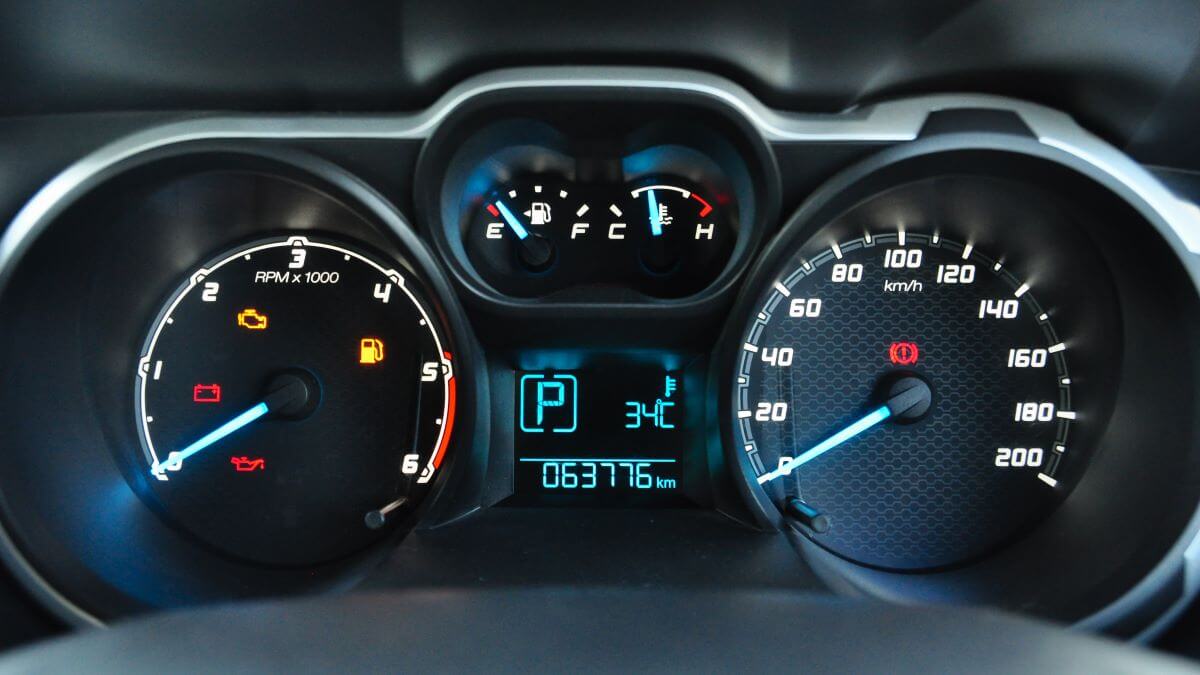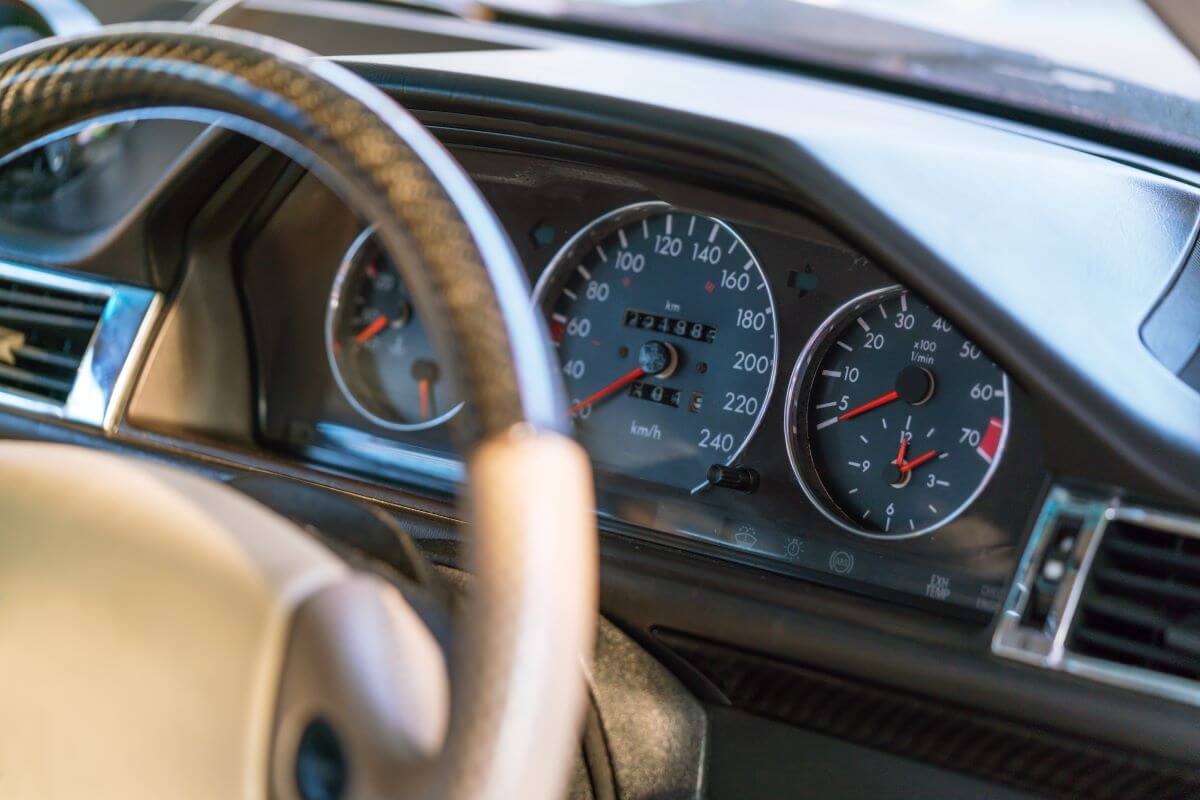At a glance:
- Both the age and mileage of a car affect its depreciation rate – the two are very closely linked.
- Learn why certain cars actually benefit from more miles on the clock.
- Older cars generally tend to suffer more wear and tear but that’s no reason to write them off completely. You should judge it on a car-by-car basis.
- Fun fact: the deprecation of used cars tends to come to a halt after around eight years.
Age versus mileage: it’s one of the trickiest questions to think about when you’re buying a used car. So, does mileage matter most, or is a car’s age more important?
In this article, we’re going to delve deep into the debate of used car mileage vs age and find out which matters more. Read on to learn the key things you need to know about car miles and vehicle age.
You’ll learn how age and mileage both affect used vehicles, as well as the importance of car depreciation and what it means. We’ve also provided a shortlist of the best high-mileage cars known for their reliability. For extra info, scroll down to our car age vs mileage FAQS.
On top of that, we’ll have a short list of the best high-mileage cars known for their reliability. And, we’ll even answer some car age vs mileage FAQs.
Contents:
- Used car mileage vs age explained
- Car miles – all you need to know
- Why does car mileage matter?
- Best high mileage used cars to buy
- Car age – all you need to know
- How does age affect a car?
- Car Maintenance – why it matters
- Car depreciation mileage vs age
- So, what is best: car age or mileage?

Used Car mileage vs age explained
Used car mileage vs age has long been a debate amongst motorists. Is a newer vehicle with higher miles on the clock better than an old car with less mileage? The truth is, there’s a lot of nuance here – in some situations higher mileage is better; in others, an older car would be preferable.
When weighing the two up, here’s what to look for in used car mileage and age:
- Mileage
Mileage simply refers to the number of miles a car has driven since it rolled off the showroom floor (you can see it on the ‘odometer’ on the dashboard). Mileage affects a vehicle’s value because certain parts in a car are built to last a certain amount of miles. The more miles a car has driven, the more likely it is that it’ll need some repairs or parts replacing.
- Age in used cars
A vehicle’s age is the key factor in determining car depreciation – that’s how much value the car loses over time. The older a vehicle, the less it’s worth. Again, this is because it’s more likely to need repairs at some point, but also because it will fall behind the standards of newer models.
Ultimately, car age and mileage both matter when buying a used car. They both affect the vehicle’s depreciation rate and they are both interlinked – mileage is taken as being high or low based on a car’s age and the older the car, the more miles it’s likely to have driven.
Below, we first explore the influence of car miles, then we look at the impact of age on a used car.
Car miles – all you need to know
When people choose to buy a used vehicle, they often go with the idea that the lower the mileage the better. But what is ‘good’ mileage for a used car? Answering this question is a little trickier than you might think.
Generally speaking, the more miles a car has driven, the more likely its moving parts are worn. However, mileage is not necessarily an indicator of quality, nor of the car’s actual state. Let’s see why.
Assume we’re looking at two used cars of the same age, but one has a much higher mileage. The car with the higher mileage definitely requires serious consideration, and the one with lower mileage would often be preferable. However, there are several complicating factors:
- Cars are meant to be driven. Many parts in a car self-lubricate whilst the vehicle is running. This means that a car which is being regularly taken out on the road will likely be in a better condition than one kept stationary for months on end on a driveway. A car sitting doing nothing over long periods of time will deteriorate faster, with parts like the engine clogging up.
- The kind of miles. Certain kinds of driving can affect cars in different ways. It all depends on the road surface, the driving conditions, and the type of driving – a car can rack up what is known as ‘good’ and ‘bad’ mileage. Those driven mainly on nice smooth motorways will usually be ‘healthier’ than those bumping over urban potholes and endless sharp turns.
So, does mileage matter? Yes… and no! You’ll need to find out a bit more about the car and how it’s been used, to decide on the state of the vehicle.
What’s good mileage for a used car?
Is there really such a thing as good and bad mileage on a car? Absolutely! It might seem strange at first, but once you break it down it makes total sense.
Basically, motorway miles are better for a car than miles gained from city driving. That’s because motorway driving is easier on the vehicle, which can operate at optimum performance, with less stress on the brakes and clutch, and greater fuel efficiency. City driving is the opposite, wearing the car down more with frequent braking and gear changes.
Motorway-driven cars will likely have more miles on the clock, whereas city-driven cars will probably have fewer miles due to a shorter commute. However, the motorway mileage will be better for the car comparatively. As a result, the number of miles on an odometer is not always an indicator of a car’s ‘health’.
If you’d like to know more about good and bad mileage on a car, read our expert guide on the topic: Motorway driving vs city driving.
What is high mileage for a car?
As a rule of thumb, high mileage in a car refers to a vehicle with 100,000 miles or more on the clock.
What is the average mileage of a car?
Calculating the average mileage of a car is tricky. According to government statistics, the average number of miles driven by cars in England each year was 7,400 miles in 2019 (the latest figures are for 2020, but they’re skewed downwards due to pandemic lockdowns so we’ve based the average on 2019 figures as it was a more normal year).
So, if you know how old a car is, then you can multiply the number of years by that average. For example, a five-year-old car could be expected to have 37,000 miles on the clock (5 X 7,400 = 37,000).
However, this number isn’t the be-all and end-all – where and how it’s been driven are also big factors.
Which cars are better with a high mileage?
Certain car brands have gained strong reputations for reliability over the years, with Toyota and Honda in particular viewed as very reliable.
Cars that rank highly in reliability scores are known for performing well with high mileage as well – such as the Toyota IQ, Honda Jazz, and Mitsubishi Lancer.
However, it really does depend on the individual car – and how it’s been driven and cared for over time. Vehicles that have a reputation for being reliable won’t necessarily outperform rivals, and motorway miles vs city mileage also comes into play.

Best high-mileage used cars to buy
If you’re looking for a reliable high-mileage car, consider some of the following. These models are well-known for being reliable with high mileage on the odometer:
- Ford Fiesta, petrol 2008-2017
- Honda Civic, diesel 2006-2012
- Ford Focus, diesel 2011-2018
- Toyota Avensis, 2003-2009
- BMW 3 Series, 2012-2018
- Skoda Octavia, diesel 2004-2013
But remember – always think about what’s good mileage on a car. Regardless of a car’s mileage or reputation, previous users could have treated it badly and done lots of urban driving, so mileage alone doesn’t tell you everything. Our used car finance calculator can assist you with each step of the car financing process.
Car age – all you need to know
A car’s age should always be a serious consideration when you’re buying a used model. And whilst most people’s ideal used vehicle would be one that is fairly new, you can often find some outstanding deals for older cars that can make them incredibly worthwhile.
Here’s what you need to think about when looking at older used cars.
How does age affect a car?
Cars are a little like humans! No, really. The older they get, the more likely things are to go wrong. Here’s how the passing of time affects a car:
- Firstly, age is the primary factor in depreciation – the older the car gets, the lower its value (except in the case of certain ‘classic’ cars)
- Newer models come with technological advancements, such as better fuel efficiency, lower CO2 emissions, and the latest safety equipment, which older models can miss out on
- Older cars, when in frequent use, can also rack up mileage on the odometer
- Daily wear and tear can have an impact
- Over time, car parts can degrade, even for vehicles that are mostly sat on a driveway
- The older a car gets, the more likely it might require repairs at some point
But don’t let age put you off right away. An older car that has been regularly serviced and maintained and which has an excellent MOT history, shows that it has a proven track record for reliability. Pair that with a low-cost starting price typical of older models and you have a very tempting deal. Nevertheless, you should still consider all aspects of the car’s age and that includes its safety features.
Important safety features to consider when buying an old car
When buying an older used car, one thing to be aware of is the vehicle’s level of safety equipment. Driver assists and safety technology have improved in recent years, meaning an older car might not have the same levels of equipment. Some useful safety tech to look out for include:
- Anti-lock Braking System (ABS) – this prevents a vehicle from skidding when the brakes are sharply applied
- Electronic Stability Control (ESC) – fitted on all new cars from 2014 as standard and building on ABS, electronic stability control helps drivers recover from a slide or spin to regain stability
- Forward Collision Warning (FCW) and Autonomous Emergency Braking (AEB) – together, these safety systems monitor the road for potential collisions, warning the driver of danger, and automatically applying the brakes if the driver doesn’t respond in time
- Blind-spot monitoring – sensors monitor the car’s blind spot, alerting you to any approaching vehicle
- Rain-sensing wipers and automatic headlights – these will bring your windshield wipers and headlamps on automatically at the appropriate times
- Reversing camera and Rear Cross-Traffic Alert – the camera will help you enter and exit parking spaces, whilst the cross-traffic alert will detect and inform you if a car is approaching from either side whilst reversing.
There are lots of other driver assists and warning systems you might want to look for too, such as lane assist and lane departure warning systems. Do your research in advance and decide what you consider essential for your needs. Discover more on the subject with our guide to safety features.
Car Maintenance – why it matters
In the car age or mileage debate, one factor that is massively important is vehicle maintenance. How long a car lasts is often directly linked to how well it has been cared for. It’s one of the reasons vehicle inspections are a key part of buying a used car. After all, a car will last longer if it’s properly maintained and serviced.
Over the course of its life, a car that’s been well maintained should have fewer faults and problems. And owners who carefully maintain their cars are more likely to fix any issues as and when they arise – before they become major problems.
When buying a used vehicle, always check the service history and look for signs it has been well cared for. Essential maintenance checks for owners and buyers include:
- Inspecting the fluid levels (and keeping them topped up)
- Ensuring the oil is regularly changed
- The inspection of hoses and belts, such as the timing belt
- Reading over previous MOT notes (and getting any issues fixed as soon as possible)
- Checking the exterior for any scrapes, dents, or scratches
- Checking the interior for wear and tear
If you’re a buyer, you can gather more information on a used car you’re interested in by doing a vehicle history check.

Car depreciation – mileage vs age
‘Depreciation’ refers to the way cars lose value over time – and this process starts the moment a new car is driven off the forecourt. So does mileage matter more for depreciation, or is the passing of time the biggest factor?
Broadly speaking, age is considered the main influence in depreciation, but that’s partly because it’s assumed that the older a vehicle is, the more miles it will have driven. Typically, the average car will stop depreciating after 8-10 years.
So why is this important in the car mileage vs age debate? Basically, it can help you decide whether a car with high mileage or an old age is well-priced and a deal worth going for.
Example: Emma is a student and wants to buy a car while she’s studying. As a student, she’s not that well-off, so doesn’t want to lose money to depreciation when she comes to sell the vehicle. She finds an eight-year-old car with relatively low mileage. This is smart, because depreciation more or less stops after eight years anyway, so she might be able to sell it again for a similar price in a couple of years’ time without losing much money.
Example: Hamza sees a car he really likes. It’s only two years old so it hasn’t depreciated much. But it does already have 60,000 miles on the clock. He decides to pass on the car – it could end up being a nightmare to sell on due to that high mileage, and will have depreciated even further.
How to calculate time-based depreciation on a used car?
The formula to calculate a used car’s time-based depreciation value is relatively simple. Take the car’s sale price and subtract its current value. Then divide that figure by the car’s age, which will equal the depreciation rate per year – how much it has dropped in value every year. You can use this formula to get a good idea of how much a second-hand car is worth and whether it’s a good deal. Use it alongside our Car Price Guide for even better results.
How to calculate mileage-based depreciation on a used car?
Knowing how to calculate mileage-based depreciation on a used car is equally simple if you take the formula at face value. Take the depreciation rate per year and divide that by the car’s annual mileage. Times that by 100, which will then equal the cost per mile.
However, there’s one problem with this calculation. It makes the cost of mileage dependent on the age depreciation rate. In most cases that won’t be an issue. But, in those instances where a car’s age and mileage are vastly different – for example, a four-year-old Ford Fiesta with 100,000 miles on the odometer – it won’t give you an accurate result. Nonetheless, it’s a useful calculation for working out mileage-based depreciation for the average car. Again, you can use this info to see whether a used vehicle is accurately priced, and a good deal or not.
Check out our complete guide on car depreciation for more info on the subject. It goes into lots of additional detail and even provides top 10 lists of the best and worst depreciating cars.
Age and mileage in petrol, diesel, hybrids and electrics
Mileage and age in petrol vs diesel vs hybrids vs electric cars is a huge topic in its own right. Figuring out what is a high mileage for a petrol car versus a diesel, EV or hybrid, comes with a range of specific considerations:
- Used diesel cars, known for having the edge in motorway driving, will likely have higher mileage and diesel engines often have a longer lifespan than petrol ones as well. Of note, low mileage city driving in a diesel vehicle can cause issues if fitted with a DPF
- However, petrol cars as they get older can be cheaper to repair and service compared to diesels, and a well-maintained vehicle can result in a longer lifespan
- Electric vehicles (EVs) have fewer moving parts than their hybrid, petrol, and diesel counterparts, this means there are less things to go wrong as the vehicle gets older (although you may have to replace the battery around the 10 to 20-year mark).
- Hybrids offer the best of both worlds with the petrol/diesel engine for long motorway journeys and battery power taking the pressure off the engine when city driving – they’re known to have good reliability too, although like EVs, the battery will need replacing in time
What is most important: car age or mileage?
So, does mileage matter more than age when you buy and sell used cars? Or is car age better than mileage as an indicator of quality and value?
As you may have gathered by now, there’s no straightforward answer to this question. It depends on your needs and what you’re after, as well as the make of car, and how previous owners have looked after it.
Here are a few pointers about what to look for in a used car’s mileage, age, and condition:
- A newer high-mileage car will have more up-to-date tech and safety features and is likely to have been driven predominantly on motorways, which are easier miles on the car. However, being younger, it will still have value to lose through depreciation – a point that will affect the resale price should you come to sell your car.
- An older low-mileage vehicle won’t have covered as many miles, so moving car parts should have less wear and tear. Being older, it should have also undergone a significant amount of depreciation already, giving you a better return when you come to sell. However, the vehicle may not feature certain safety equipment or tech. And, its low mileage could be a sign it has mainly been driven in the city, which can be harder on a car.
Perhaps the ultimate factor in age vs mileage is car maintenance. How well the owner has maintained the used vehicle is paramount in terms of how it will perform and how long it’ll last. An old, high-mileage car that’s been carefully serviced and cared for can still enjoy many more miles on the road. A car that’s consistently maintained poorly and badly cared for will likely run into more problems before it reaches an old age or high mileage.
So, whenever you buy a used car, you should always perform a vehicle inspection and a car history check, paying close attention to the service and MOT history. You can use our buying a used car checklist too, to help you every step of the journey.

Does mileage matter or age?
We’ve explored every aspect of the question, which is best: car age vs mileage? We’ve discussed what age and mileage are in terms of depreciation, and how both affect used cars. And although there’s no definite answer to which is best, there are pros and cons for a young car with high-mileage and for an old vehicle with low-mileage.
And while motorway miles are easier on a vehicle compared to stop-go city driving, ultimately, the most significant aspect in regards to used car age and mileage is actually vehicle maintenance. A properly serviced and well-maintained car is typically best.
Combine a well-serviced vehicle and motorway miles and you have a recipe for a long-lasting used car. Discover why that’s the case with our guide on City vs Motorway Driving.


